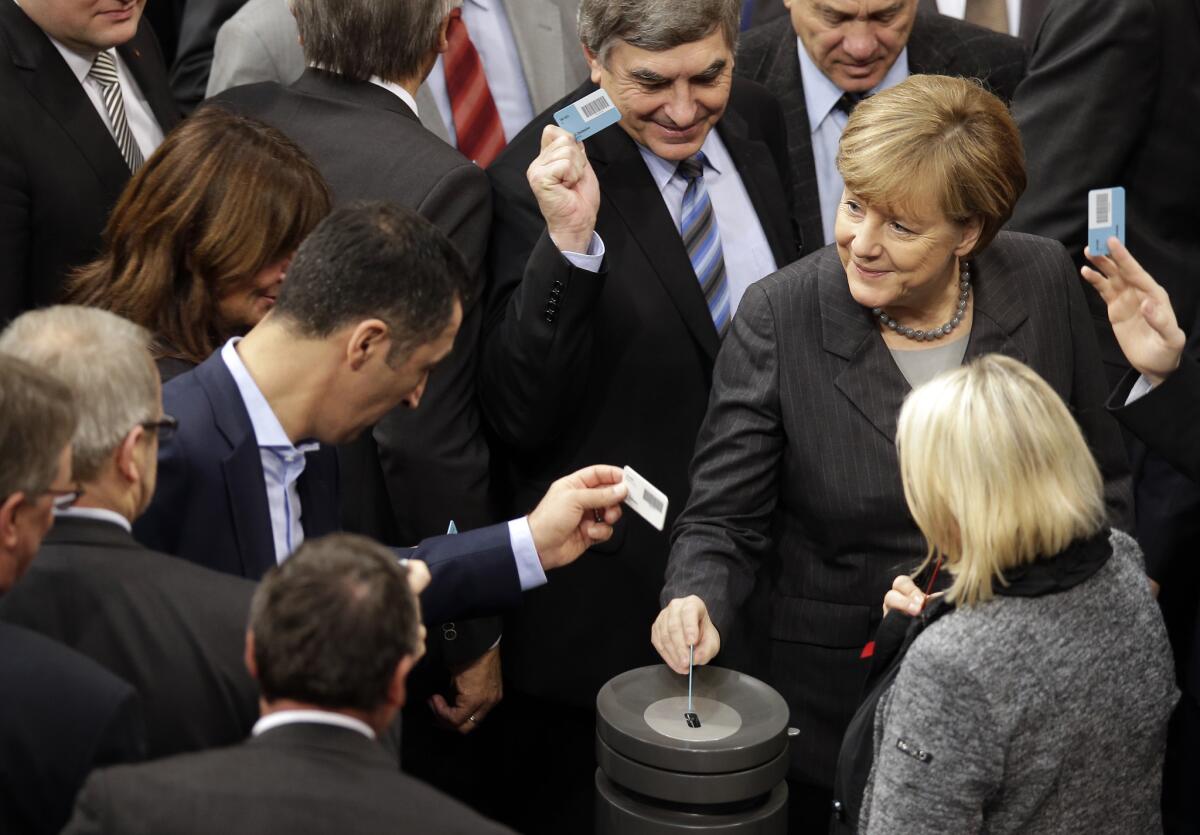German parliament approves noncombat mission in battle against Islamic State

Chancellor Angela Merkel casts her vote in parliament after a Friday debate on a German noncombat mission against Islamic State.
Reporting from Berlin â German lawmakers voted Friday to send troops and six aging reconnaissance planes to support the campaign against the Islamic State in Syria, approving a measure that avoided any mention of war in a proudly pacifist country still wary of combat more than seven decades after World War II.
Chancellor Angela Merkelâs government cast off a long-standing refusal to provide military support for the U.S.-led coalition air war against Islamic State, which has seized large swaths of land in Syria and Iraq. The move was seen as an act of solidarity with France following the Nov. 13 terror attacks in Paris that killed 130 people.
Germanyâs role in the campaign so far has been limited to northern Iraq, where about 100 of its soldiers are training forces opposed to Islamic State and supplying them with weapons.
Despite her own misgivings about joining the fight against Islamic State, Merkel first had her cabinet approve the deployment Tuesday and watched in silence as deputies from her coalition pushed the measure through parliament Friday. It was approved 445 votes to 146, with seven abstentions.
âWeâve turned our backs on this region for years and Iâd think weâd need to have damn good arguments to continue looking away considering the inhuman brutality that weâve seen,â Norbert RĂśttgen, a close ally of Merkel in parliament and head of the foreign affairs committee, said in a speech before the vote. âNowâs the time to act -- for the victims that we should be protecting.â
Merkel, who needs Franceâs support in finding European Union-wide answers to the flood of refugees to Europe, had promised France last week âany and all supportâ in the fight against terror.
In a similar vote on Wednesday, the British Parliament backed, by a 397-223 vote, the request by Prime Minister David Cameronâs government to allow airstrikes in Syria.
The German parliament gave the government a year-long mandate to send six of the 29 operational Tornado reconnaissance aircraft in the nationâs air force â which date from the 1970s and often lack spare parts â and as many as 1,200 soldiers to support the mission against Islamic State. Germany will also send a frigate to support the French aircraft carrier Charles de Gaulle as well as midair tanking aircraft.
In a small but important concession to antiwar activists in Germany and a general public uneasy about seeing German soldiers fighting abroad, the Luftwaffe planes will not fly combat missions themselves but instead support other planes in the anti-Islamic State coalition.
âThe plain truth is that this is war,â said Thomas Jäger, a political scientist at Cologne University. âBut itâs just not popular to call it a âwarâ in Germany.â
âThe government pushed this through parliament as fast as they could before anyone could think too much about the consequences of unlimited support for France like Germany supported the United States after 9/11,â he added.
Germany quickly followed the U.S. into Afghanistan after the Sept. 11 attacks â with troops first serving as peacekeepers and then as combatants. A total of 57 German soldiers were killed during the 13-year deployment of about 5,000 troops that wrapped up at the end of 2014.
After World War II, West Germany long declined to take part in foreign military operations, insisting its constitution barred any kind of deployment outside of NATO. The public, traumatized by the war and memories of the destruction, was also strongly opposed to even peacekeeping missions. The country only gradually began to drop that self-imposed taboo after the end of the Cold War and the peaceful reunification in 1990 of East and West Germany.
Germany sent patrol boats to the Mediterranean as a token gesture of support during the 1991 Persian Gulf War and the buildup preceding it. The Constitutional Court finally ruled in 1994 that out-of-area operations outside of NATO did not violate the constitution provided parliament backed them.
Germany also sent a small number of Tornado fighter jets to join the U.S.-led NATO attacks against Yugoslavia in 1999.
However, the past still haunted Germany and even in the last decade, as the number of German soldiers killed in Afghanistan kept rising, the government long resisted using the term âfallenâ in reference to the dead, fearing associations with World War II.
Thorsten Hasche, a political scientist at the University of GĂśttingen, said that he thinks German political leaders are underestimating the publicâs understanding and acceptance of the battle against Islamic State. He noted that with hundreds of thousands of Syrian refugees arriving in Germany this year, the effects of the war in their homeland have already been touching German towns and cities for months.
âI think the public has a more mature view on this than the government gives it credit for,â said Hasche, pointing to an opinion poll for the leading ARD TV network on Friday that showed 59% of respondents supported Germanyâs restricted deployment of the Tornado planes to help fight Islamic State.
âThe government is avoiding the term âwarâ and instead talking about a âmilitary intervention.â Since World War II, itâs a term they canât talk openly about,â he said. âBut the fact is this is a war. I think most Germans understand that and accept that, especially with all the refugees from Syria in Germany.â
Kirschbaum is a special correspondent.
ALSO
Obama: I donât expect Putin to do a â180â to help fight Islamic State
Russia accuses Turkish president of benefiting from oil trade with Islamic State
U.S. to send about 200 more special operations troops to Iraq to fight Islamic State
More to Read
Sign up for Essential California
The most important California stories and recommendations in your inbox every morning.
You may occasionally receive promotional content from the Los Angeles Times.










